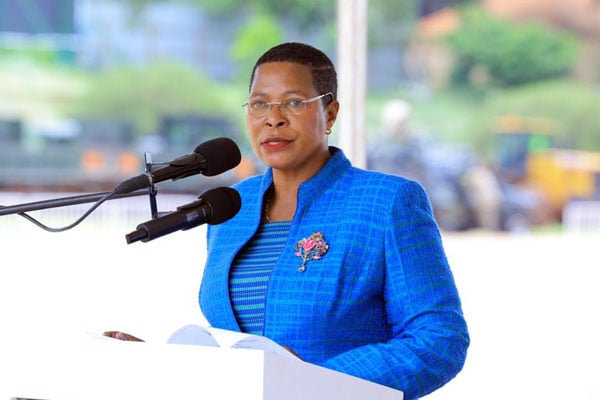OPM rejects proposal to scatter refugees

South Sudanese refugees receive food from World Food Pragramme during the World Refugee Day celebrations in Bidi Bidi settlement camp in Yumbe District in June 2019. PHOTO /RACHEL MABALA
What you need to know:
- The Second Deputy Prime Minister, Gen Moses Ali, said the proposal is not a government policy matter.
- 95%: Percentage of refugees who rely on the environment for firewood and building materials.
BY TOBBIAS JOLLY OWINY
T he Office of the Prime Minister (OPM) has rejected a proposal by the State Minister for Environment, Ms Beatrice Anywar, to scatter refugees across districts, saying it contravenes the country’s policies and position on hosting refugees.
On October 5, Ms Anywar challenged the government to scatter refugees in various areas, saying concentrating them in one place has led to environmental degradation in and around the settlements.
“The daily needs [of refugees] have caused a lot of degradation because there is pressure to collect firewood to cook food every day,” she said, adding that it had destroyed the forest cover.
Ms Anywar made the remarks while launching the new project dubbed ‘restoring and conserving degraded and fragile ecosystems for improved livelihoods among the refugees and host communities in Kampala.
She said if refugees are spread out, they can be engaged in several productive activities and restore the forest cover quickly.
However, the Second Deputy Prime Minister Gen. Moses Ali, told Daily Monitor that Ms Anywar spoke out of context.
“This minister’s statement is not a policy matter, and the government has got policies that guide every action it takes. What she said is like me getting up to speak anything here because I am a minister,” Gen Ali said.
“You do not need to take her statement as an issue that requires government attention, she is a minister and is entitled to her opinions and views but this one cannot be done,” he added.
The United Nations High Commissioner for Refugees (UNHCR) data of August 31 shows that the country hosts 1.5 million refugees.
Ms Mahoua Parums, the UNHCR deputy representative in Uganda, said they have injected funds to restore the environment around all the refugee settlements across the county.
Ms Parums said massive deforestation was also elsewhere in the country.
“We are aware that there is a serious degradation in Uganda, there is a lot of funding that is injected into these tree planting activities and we follow up to ensure the trees grow well to ensure what is cut is replaced because we are all concerned by this situation,” she stated.
“We have partners with whom we are engaged in tree planting across all the settlements not only in Adjumani but everywhere we have refugees, we do tree planting,” she added.
According to UNHCR, four out of five people who flee their homes rely on firewood for cooking and heating, which is a major cause of deforestation in most refugee settlements across the world.
Uganda has one of the most favourable refugee protection environments in the world, providing for freedom of movement, access to land for agriculture and settlement in line with the Refugee Act of 2006.
UNHCR has partnered with NGOs in refugee settlements and host communities in West Nile to plant 588 hectares of trees through cash for work programmes, support operations for 20 tree nurseries as well as support 58 refugee groups with briquette making machines and training in 2019.
In Adjumani, 3128 Sq.km of land on which 17 refugee settlement facilities are established to host a total of 202,433 refugees according to UNHCR.
At least 400,000 trees out of the 2019 total target of 700,000 trees had already been planted by the beginning of July in Adjumani district.
In October 2018, a joint United Nations and World Bank report warned of the competition for available resources like trees, land for cultivation as a possible cause of tension between the refugees and host communities.
Early this month, a project aimed at restoring and conserving degraded and fragile ecosystems for improved livelihoods among the refugees and host communities was launched.
It will ensure that refugees and host communities have access to alternative sources of cooking fuel and decrease the demand and utilisation of natural resources within and around refugee settlements.
It also aims at improving access to sufficient, healthier, sustainable, and alternative sources of energy, increased capacity to construct and maintain the decreased dependence on energy for unsustainable and unregulated sources for households.
The four-year project will be implemented in five districts which include Kikuube, Kyegegwa, Kamwenge, Terego and Yumbe.
Other partners include the Government of Uganda, World Agroforestry, Uganda Biodiversity Fund, and Enabel.


